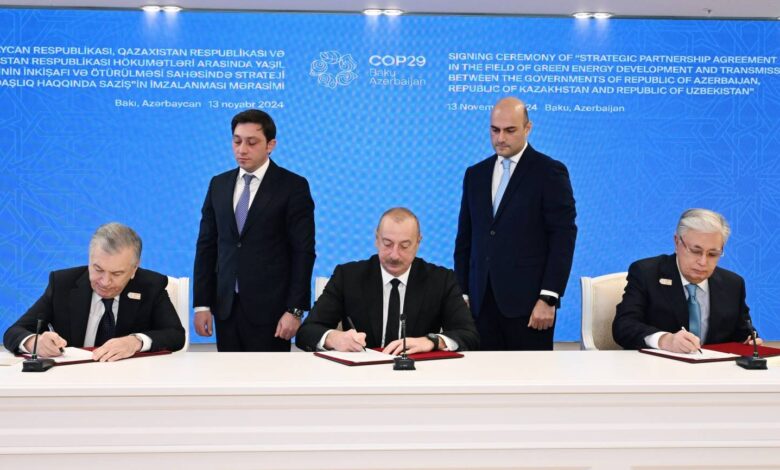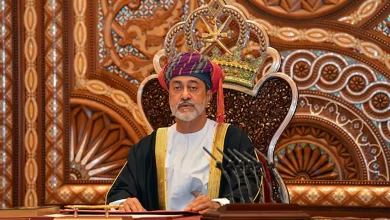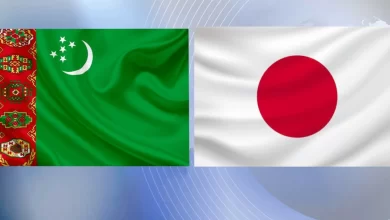COP29: Caspian and Central Asian states make progress in promoting “green” trade plan

While discussions on containing global warming have bogged down inside the blue zone at the COP29 climate summit in Baku, Caspian Basin and Central Asian states have been busy on the sidelines looking for ways to boost “green” trade.
The Middle Corridor, an emerging trade route linking China and Europe via the Caucasus and Central Asia, has been a major topic of discussion on the fringes of COP29. In the spirit of the climate gathering, participants say they are intent on developing a sustainable “green” energy corridor, involving the construction of new infrastructure and the digitization of trade systems.
There is a large financial incentive for such agreements. With the Russia-Ukraine war passing the 1,000-day milestone, the corridor has become attractive as an alternative route that bypasses Russia. The World Bank estimates that trade along the corridor will triple by 2030.
The first major Middle Corridor development during COP29 occurred on November 13, two days after the gathering’s start, when the presidents of Azerbaijan, Kazakhstan, and Uzbekistan signed a “Strategic Partnership in the Development and Transmission of Green Energy.”
While light on firm commitments, a post-signing briefing by the presidents gave some clues about their intentions. Azerbaijani leader Ilham Aliyev confirmed that the partnership is related to an ongoing effort to build an underwater power line across the Caspian Sea. The project was unveiled last May and is designed to facilitate the trilateral sharing of electricity generated from renewable sources, and, most importantly, the export of power to Europe.
“The feasibility study for this project is nearing completion, so we will connect Central Asia, the Caucasus, Europe, the Caspian and the Black seas with a single energy corridor,” Aliyev said.
Aliyev also noted progress on another crucial link in that corridor – an underwater Black Sea cable passing from Georgia to European Union territory. Such projects are important for Azerbaijan’s ongoing efforts to diversify its fossil fuel exports-dependent economy and become an alternative power source for Europe.
At the news conference, Kazakh President Kassym-Jomart Tokayev directly linked the power line projects to the development of the Middle Corridor. “The practical fruition of this agreement will contribute to the development of the Middle Corridor as a green bridge connecting our economies,” said Tokayev after the signing. “Close cooperation in this key area will step up the exchange of experience and advanced technologies among the three states and contribute to the further strengthening of our energy security.”
COP29 has also proved to be a fruitful venue for inking other Middle Corridor-related business deals, and, in tandem, a platform for China to demonstrate its growing economic role in the Caspian Basin.
Another infrastructure agreement signed on the sidelines of the conference underscores the point. On November 12, Azerbaijan, Kazakhstan, and China established a joint venture to build a new intermodal cargo terminal at the Port of Baku. China is additionally helping to build a container hub on the other side of the Caspian Sea at the Kazakh port city of Aktau.
At a Middle Corridor-focused roundtable held on November 20 under COP29’s auspices, Rashad Nabiyev, an Azerbaijani development official, said Azerbaijan expects to double the number of Chinese cargo trains passing through its territory in 2025. The United Nations Economic and Social Commission for Asia and the Pacific (ESCAP), the UN agency in charge of promoting regional economic contacts, also endorsed the regional initiatives during the roundtable discussion.
“ESCAP will continue to support the development of sustainable and digital transport corridors, including the Middle Corridor,” said Armida Salsiah Alisjahbana, an agency representative.
Meanwhile, a sting operation conducted by a transparency watchdog group, Global Witness, alleges that Azerbaijan has used its hosting status of COP29 to hold talks with potential partners on the development and expanded export of fossil fuels seen as the primary source of global warming.
A report distributed by Global Witness, relying on undercover reporting in which a researcher for the group posed as a representative of an energy investment firm when conducting a video call with Elnur Soltanov, the COP29 CEO and Azerbaijan’s deputy energy minister, appears to show a conflict of interest in which the Azerbaijani official does not draw a clear distinction between his COP role and his governmental position.
“COP29 officials abused their positions by facilitating talks about oil and gas deals at a climate conference,” Global Witness alleges in a statement. “Petrostates are perfecting a sinister playbook which sees COP as just another business opportunity for polluters.”
Source:Eurasianet



